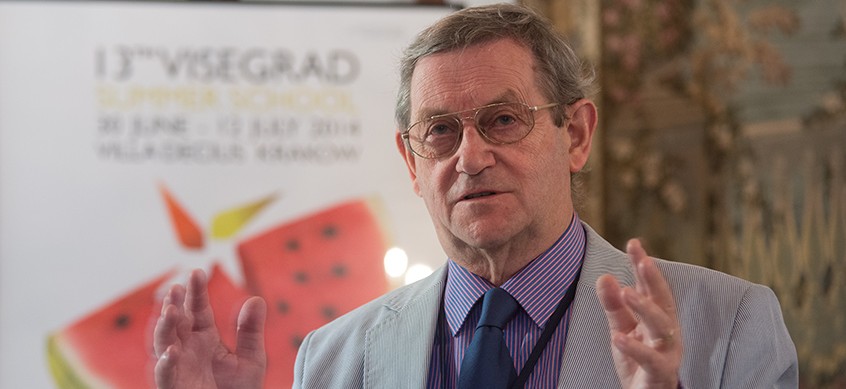
The day when Norman Davies, outstanding British-Polish historian unexpectedly agrees in the morning on giving a lecture for the students of Visegrad Summer School is called Thursday. Davies talked about the legacy of postwar Europe, gave his interpretation on the Ukrainian crisis and shared his thoughts on identity.
“I quoted him million times in my Bachelor thesis” – one could hear such remarks before the lecture started. Norman Davies who got the polish citizenship only two days before his lecture in Villa Decius is indeed one of the most important names in fields of History of Europe, Poland and the United Kingdom. Although Davies’ visit to Villa Decius was not entirely unexpected, the news that he would give a lecture at noon was announced in the morning.
“The world that you live in was designed by the results of the II. World War” – started his lecture Norman Davies. The fact that one half of the world was conquered by Stalin is the legacy of postwar Europe that very few westerners understand – he said. This conquer resulted in the 40 years long cold war that is two nuclear arm camps facing each other in an intense conflict, using all methods of conflict except military force.
Then the great change “happened through miscalculation”. Davies shared a very telling anecdote about how a local secretary from the provincial town of Stavropol named Gorbachev became the supreme dictator of the soviet system. “Gorbachev – said Davies – understood very little from the system he’s been in charge of”. About Gorbachev Davies said: he had no clue that the system was built on coercion and introducing the free speech can threaten the whole system.
Europe after 1989 has changed out of all recognition – continued Davies. „Most of the countries hastened voluntarily to join EU and NATO and the big questions of the last 25 years has been whether EU would expand geographically or get to the level of political union” – he said. Meanwhile in the world power system China has come out of the shadow of Soviet communism and has become the world’s largest economic power challenging the one remaining superpower the US.
“The conflict of national narratives has not been resolved” – said Davies when he was asked to tell his interpretation of the situation in Ukraine. He detects two different narratives clashing constantly: Russia’s/Putin’s narrative and the Ukrainian national narrative. According to the first Ukraine is not a state and only external interference is preventing it from rejoining Russia. While the second says that Ukraine’s people, like all other nations, have the right to control their own destiny.
The problem with the Ukrainian narrative in Davies’ opinion is that it is not entirely plausible as a large part of Ukrainian soil has been settled by Russians. Odessa and Kijew had been russified, and the Donetsk was an industrial city to which a lot of Russian immigrants moved. “It was a main focus of soviet economic development, the working class of the Donbas was the favorite proletariat of the Soviet Union” –explained Davies why “this is an area where the population is still involved in what we call sovietism”.
„We all have a capacity of multiple identities” – reached the last part of his lecture Mr. Davies. He, as a new citizen of Poland is maybe the best example of this multi-layered identity. „This idea of multiple identity is seen as number one enemy by nationalists” – said Davies – “who would force you to be either one or the other”. This is, according to what he said, ignorance of some proof of this capability of having multiple identities: for example the natural capacity of human beings to speak several languages.
Eszter Neuberger




























